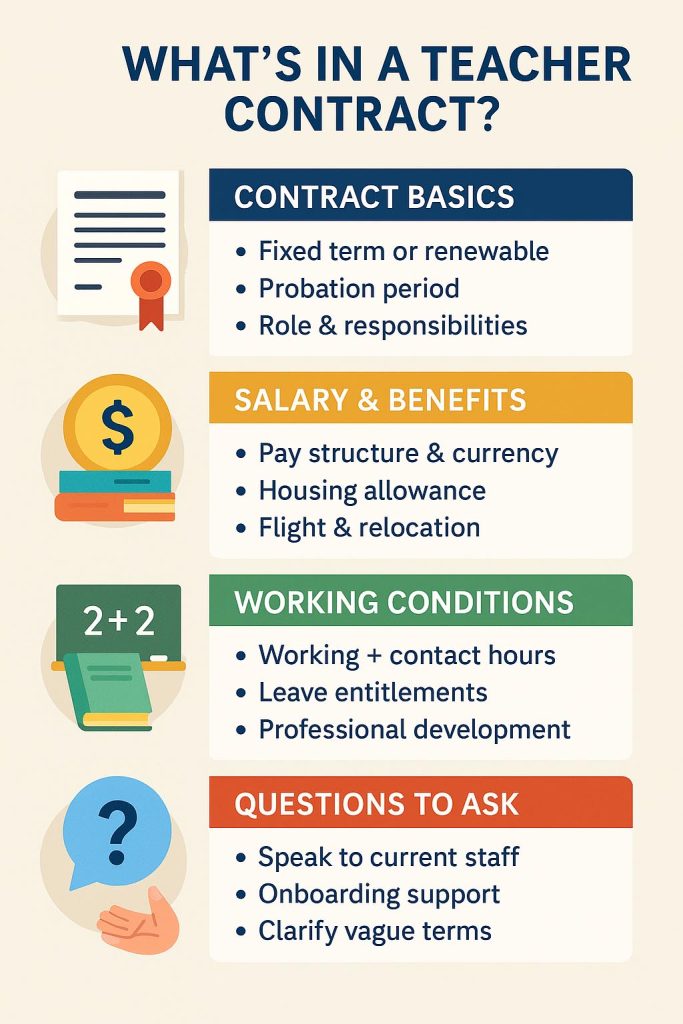Accepting a teaching position abroad can be one of the most exciting steps in an educator’s career. But before you pack your bags, there’s one document that deserves your full attention: the contract. Buried within pages of formal language could be details that shape your day-to-day experience—from housing arrangements and working hours to professional development expectations and how disputes are handled.
Our article here outlines the most important elements of international teaching contracts that educators should review before signing. Whether you’re new to teaching overseas or considering a change in schools or regions, we’ll help you understand what to look for, what to clarify, and how to ensure the offer aligns with your professional goals and personal needs.
Understand the Basics of Your Employment Contract
Before looking at salary or benefits, it’s essential to understand the fundamentals of your employment agreement. This section sets the framework for your role, responsibilities, and legal obligations at your new school.

Contract essential considerations include job title, contract length, salary, benefits, and expectations
Contract Type and Duration
Most international teaching contracts are fixed-term, typically spanning one to three years. These may or may not be renewable, so it’s worth checking whether renewal is automatic or performance-based. Some schools include a probationary period—usually the first three to six months—which allows both parties to assess fit. Ensure you’re clear on what performance benchmarks will be used during this time.
Job Title and Role Description
A well-written contract should clearly outline your position, teaching load, subjects or year groups, and any additional duties. If you’re being hired as a “homeroom teacher,” does that include lunch duty, clubs, or parent liaison? If you’re entering a leadership position, ensure responsibilities like staff appraisal or curriculum development are explicitly stated. Vague role descriptions can lead to mismatched expectations once you’re on the ground.
Salary, Benefits, and Deductions
The financial package is often a key motivator for teaching abroad—but it’s not just about the headline salary. A strong contract should clearly outline not only how much you’ll be paid, but what’s included to support your life outside the classroom.

Considering key parts of an international teacher compensation package, including salary, housing, flights, health insurance, and pensions
Base Salary & Currency
Your contract should specify the monthly or annual salary and the currency you’ll be paid in. This is particularly important in countries with fluctuating exchange rates or inflation. For example, some schools in China or Thailand may offer payment in local currency, while others (especially in the Middle East) may pay in USD. Clarify the payment schedule—monthly is typical—and whether taxes will be deducted or if you’re responsible for filing locally.
Housing and Utilities
Many international schools provide either a furnished apartment or a monthly housing allowance. Find out what’s included—some packages cover rent only, while others include utilities, internet, and maintenance. If you’re expected to find housing independently, confirm how the allowance compares to actual local rental prices in safe, accessible areas.
Flights, Relocation & Shipping
Most schools will offer a flight allowance at the start and end of your contract. Some may also cover return flights during annual leave for long-term roles. Check if relocation assistance includes shipping costs for personal belongings, or just a luggage allowance. These benefits can make a significant difference in out-of-pocket costs during transition.
Health Insurance and Pension
Your health coverage should extend to both work-related and non-work-related incidents, ideally giving you access to private healthcare facilities. Ask whether dependents are covered if you’re relocating with a family. In some countries, schools also contribute to local pension schemes or offer private retirement plans—though portability may vary depending on your nationality and destination.
Working Conditions and Expectations
Understanding what’s expected of you day to day is just as important as reviewing your salary. Working conditions can vary significantly across international schools, so it’s essential to clarify the rhythm and demands of your role before signing.

It’s crucial to consider various factors when it comes to work contracts
Working Hours & Calendar
Don’t assume that a “standard” school day is the same everywhere. Teaching hours typically range from 20 to 30 contact hours per week, but your total working time—including planning, meetings, supervision, and school events—may be considerably higher. Some schools run extended academic calendars, particularly in the Middle East and East Asia, while others follow more Western-style holiday schedules. Always ask for a sample academic calendar if it’s not provided.
Leave Entitlements
Annual leave should align with school breaks, but this isn’t always guaranteed—some contracts count only teaching days, while others expect teachers to be on campus for training, camps, or recruitment. Clarify sick leave policies and whether you need a medical certificate after a single day’s absence. If you’re planning to start a family or have caregiving responsibilities, review maternity/paternity leave, and any options for compassionate or unpaid leave.
Professional Development
Some schools include annual CPD budgets, while others expect you to pursue training on your own time and cost. Clarify how performance reviews are conducted and whether there are formal opportunities for growth. Schools that invest in staff development often have clearer promotion pathways and a more collaborative culture—important if you’re hoping to move into leadership.
Questions to Ask Before You Sign a Teacher Contract
Even with a detailed contract in hand, it’s worth going a step further to fill in any gaps and gain real-world insight into what your experience might be like. A few well-placed questions can help you make a fully informed decision.
- Can I speak to a current or former teacher? A reputable school will usually be happy to connect you with staff who can share their experience. It’s one of the best ways to get an honest perspective on school culture, workload, and staff turnover.
- Is there a staff handbook or onboarding guide? These documents often contain useful details not covered in the contract—like expectations for dress code, email response times, or holiday travel policies.
- What support is available for relocation and settling in? Ask whether there’s airport pickup, a housing agent, or help setting up a bank account and phone. A strong onboarding process often reflects broader institutional care and organisation.
- Can vague or missing contract terms be clarified in writing? If any parts of the contract feel ambiguous—such as “occasional duties” or “as assigned by the principal”—ask for a written clarification or appendix. This protects both parties and helps avoid misunderstandings later.
Read the Fine Print, Protect Your Future
Signing a teaching contract abroad is a commitment that shapes your professional path and personal wellbeing. While a generous salary or desirable location may catch your attention, the finer details, such as working hours, benefits, exit clauses, often determine how supported and satisfied you’ll feel once you’re in the role.
Take the time to read every section carefully, clarify anything that feels vague, and don’t hesitate to ask questions. A contract should be a fair, transparent agreement—never something you feel pressured into signing. When in doubt, seek advice from experienced educators, online forums, or legal professionals familiar with international employment. A well-understood contract sets the tone for a positive, rewarding experience abroad.
For more guidance on navigating international school contracts, vetted job listings, and professional resources, explore the tools and insights available at AISL Mall.








